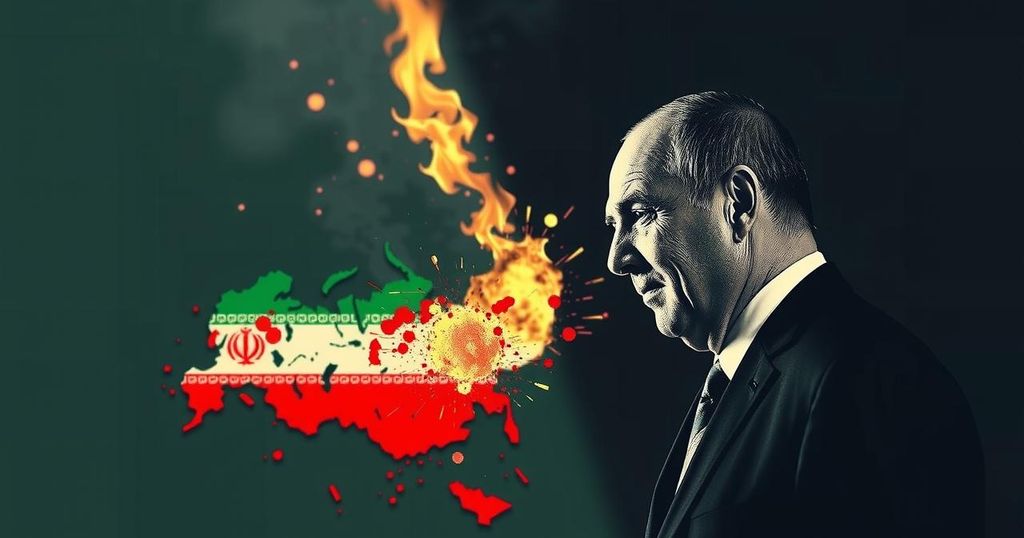Russia’s Strategic Shift: The Potential Abandonment of Iran

This article discusses the evolving relationship between Russia and Iran, highlighting Putin’s flexible foreign policy, which has historically adapted to immediate national interests. As tensions rise over regional influence, particularly in Syria, there is potential for Russia to pivot away from Iran, utilizing its strategic leverage in ongoing negotiations related to the Ukraine conflict.
Russian President Vladimir Putin has often referenced his proficiency in judo, touting it as a vital skill that has imparted a key lesson: flexibility. This principle has significantly shaped Russia’s foreign policy, especially in its complex international relationships. Despite a longstanding 30-year partnership, Russia refrained from intervening when Azerbaijan reclaimed Nagorno-Karabakh, a territory that was initially seized with Russian assistance. Furthermore, Russia’s recently adopted hostility towards Israel, coupled with its renewed amity towards Saudi Arabia after years of strained ties, illustrates Putin’s adeptness at aligning foreign policy to serve immediate interests. Currently, Russia appears poised to pivot away from its ally, Iran, primarily due to two factors: the weakening of Iran’s influence in Syria and Armenia and leveraging its role in the Middle East to extract concessions regarding the ongoing conflict in Ukraine. Notably, while a strategic treaty aimed at deeper defense collaboration is anticipated between the two nations, their objectives diverge significantly in areas of mutual influence, particularly Syria. In Syria, Russian and Iranian interests have increasingly collided. While both nations supported Bashar al-Assad during the civil war, their long-term visions for Syria are incompatible. Russia seeks to reinforce Syria as a stable ally, whereas Iran aims to utilize Syrian territory to further its conflicts with Israel. Following its 2022 military engagement in Ukraine, Russia diverted resources from Syria, permitting Iran to fill the resulting power vacuum. Recently, however, Israeli military actions have diminished Iran’s standing in the region, ultimately enhancing Russia’s influence. Despite Iran attempting to escalate its operations in Syria, Russia’s involvement has impeded these efforts, as made evident by statements from Aleksander Lavrentiev, Putin’s representative, who has emphasized Russia’s commitment to preventing conflict spillover into Syria. This complex dynamic has led to Israel strategically navigating relations with Russia, refraining from actions that could jeopardize this partnership, such as military support for Ukraine. Tensions have since surfaced over the flow of Iranian arms through Syria, an issue exacerbated by Russia’s reluctance toward aiding Iranian military capabilities. Iran is cognizant of its relationship with Russia, as articulated by Mehdi Sobhani, the Iranian ambassador, who remarked, “We are not allies. We have some differences, and we have some mutual interests.” In light of discussions centering on a potential peace settlement in Ukraine and Moscow’s expansive strategic aspirations, it is conceivable that Russia could leverage its capacity to restrict Iranian arms operations in Syria as a bargaining tool. The overarching theme of Russian foreign policy is characterized by a desire for increased global influence—an ambition fundamentally detached from any ideological constraints of the past. Ultimately, should it benefit Russian interests, President Putin would not hesitate to abandon Iran.
The intricate dynamics of Russian-Iranian relations have been marked by mutual cooperation juxtaposed with divergent national objectives, especially in the Middle East. While the alliance has flourished recently, particularly in response to Western sanctions, significant tensions have emerged regarding Syria’s future and influence in the region. Russia’s foreign policy, driven by strategic flexibility, has repeatedly shifted in accordance with its immediate national interests, often at the expense of long-standing alliances.
In conclusion, Russia’s current trajectory indicates a potential reorientation away from Iran, highlighting the shifting sands of international alliances shaped by opportunistic interests. With contrasting goals in Syria and evolving geopolitical conditions, Russia may leverage its influence over Iranian operations as it engages in negotiations, particularly concerning peace efforts in Ukraine. This pattern of strategic maneuvering underscores President Putin’s willingness to prioritize national interests above all else.
Original Source: www.newsweek.com








